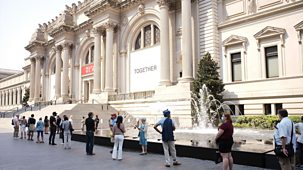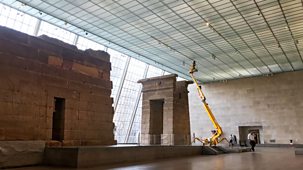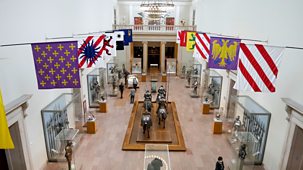
Series 1: Episode 1
The series begins in spring 2019, when the Metropolitan Museum of Art is in its pomp – the coffers full, visitor numbers are up and staff preparing to mark, in one year's time, the museum’s 150th anniversary. The museum has long been planning a series of stand-out exhibitions and events. The art press gather for a breakfast in the American Wing sculpture court, surrounded by treasures reflecting the tastes of the philanthropist founders of the Metropolitan. These were new-money industrialists and financiers, who believed that the lives of New York's teeming millions would be improved by their proximity to beauty. That beauty, however, was vested almost exclusively in the European arts and the artefacts of classical civilisations. The museum is aware that the tastes of the Gilded Age aren't for everyone, and a dance display by the House of Gorgeous shows they're awake to the woke.\n\nIn his fifth-floor office sits Met president and CEO Dan Weiss, the art historian recently appointed to steer the largest art museum in the Americas out of a period of falling visitor numbers and financial turbulence. Overlooking Central Park, he revels in a painting by Alfred Sisley, a print of which once graced his college digs. Those who built the Met in 1870 wanted an American Louvre, an audacious vision, he says, considering they had no art. The likes of JP Morgan, a previous president, simply spent and lent big, snapping up artefacts all over the world and donating their own collections. Weiss is also spending big for next year's special exhibitions and, with the Met’s director Max Hollein, planning a slew of great events. He's also splashing out on capital projects like the new six-acre glass roof for the European Paintings gallery, at $150m, just one improvement that will make 2020 a landmark year. \n \nThe inner workings of the Met are revealed with excursions into various departments, and the warren of labs, workrooms and archives above and deep below the public areas. In the Arms and Armour workshops, they're repairing gauntlets before sending some of their massive collection off to Vienna, and preparing for the arrival from Europe of new old iron and steel for a great show of German armour, The Last Knight.\n\nThere's more quiet frenzy in the Costume Institute. The conservators have just recovered from the 2019 Met Gala, the starry night where celebrities parade for the camera and make the donations that fund this department. Staff have just delivered this year’s annual show, Camp, a pink celebration of costume drama that is pulling in the crowds. In the next room, they're amassing black garments for the monster 2020 show currently being crafted by British uber-designer Es Devlin. \n\nThe film drills deepest into preparations for a show about British mercantile expansion and its impact on interior design. Assistant curator Dr Wolf Burchard has been spirited from the National Trust to Fifth Avenue, his mission: to tell a 500-year story of enterprise from the Tudor to Victorian eras. The museum's existing British galleries are being remodelled for the occasion, and Burchard and his team must navigate the construction works to create a display of 700 items. They've got a £20m budget and seven months. \n \nTwo floors up, colleagues face similar time challenges as they build the keystone exhibition Making the Met. It tells the tale of the museum's 15 decades using objects from every department, and new ones donated by sponsors and benefactors. Outside, Austrian Max Hollein, only a few months in post, leads the drive to make the Met feel more modern, diverse and inclusive. For the first time since the austere Beaux-Arts building opened, niches in the exterior are filled with art - a series of bronzes by Kenyan-born artist Wangechi Mutu. She tells how groundbreaking this initiative is. \n\nThe Met is on a roll. We are with the glitterati flocking across the Upper East Side for a private viewing of the British exhibition. The public opening of the new galleries, on 2 March 2020, heralds the start of the 150th year programme. Curator Burchard says how strange it feels to have his galleries packed with thousands. \n \nThat very same night, the first victim of Covid-19 is in hospital. Within days, the Met will be the first large institution in the city to lock down. As New York becomes a ghost town, viewers are on the inside watching the museum trying to protect one million exhibits from light damage and moths, wrestling with 20 per cent staff cuts and losses of $150m, while working towards a reopening, sometime in an uncertain future. When that day comes, we witness emotional scenes that underline a truth: that New Yorkers regard the Met as their own. More than just a museum, it's a resource and a refuge.
Source: BBC 4
Most recent episodes of Inside America's Treasure House: The Met
Inside America's Treasure House: The Met
Series 1: Episode 3
Autumn, 2020. The Met is open, but in a safe and very limited way. Visitor income helps keep the museum running, so times are hard. Since it was founded, like so many US arts in ...
27-08-2024
BBC 4
Inside America's Treasure House: The Met
Series 1: Episode 2
The Met's 150th anniversary year has been derailed by Covid-19. Then in May 2020, the murder of George Floyd, only the latest in a litany of killings of African Americans by whi ...
20-08-2024
BBC 4
Inside America's Treasure House: The Met
Series 1: Episode 1
The series begins in spring 2019, when the Metropolitan Museum of Art is in its pomp – the coffers full, visitor numbers are up and staff preparing to mark, in one year's ...
13-08-2024
BBC 4
Most popular episodes of Inside America's Treasure House: The Met
Inside America's Treasure House: The Met
Series 1: Episode 1
The series begins in spring 2019, when the Metropolitan Museum of Art is in its pomp – the coffers full, visitor numbers are up and staff preparing to mark, in one year's ...
13-08-2024
BBC 4
Inside America's Treasure House: The Met
Series 1: Episode 3
Autumn, 2020. The Met is open, but in a safe and very limited way. Visitor income helps keep the museum running, so times are hard. Since it was founded, like so many US arts in ...
27-08-2024
BBC 4
Inside America's Treasure House: The Met
Series 1: Episode 2
The Met's 150th anniversary year has been derailed by Covid-19. Then in May 2020, the murder of George Floyd, only the latest in a litany of killings of African Americans by whi ...
20-08-2024
BBC 4



